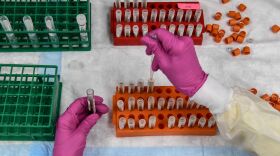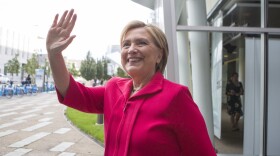
Terry Gross
Combine an intelligent interviewer with a roster of guests that, according to the Chicago Tribune, would be prized by any talk-show host, and you're bound to get an interesting conversation. Fresh Air interviews, though, are in a category by themselves, distinguished by the unique approach of host and executive producer Terry Gross. "A remarkable blend of empathy and warmth, genuine curiosity and sharp intelligence," says the San Francisco Chronicle.
Gross, who has been host of Fresh Air since 1975, when it was broadcast only in greater Philadelphia, isn't afraid to ask tough questions. But Gross sets an atmosphere in which her guests volunteer the answers rather than surrendering them. What often puts those guests at ease is Gross' understanding of their work. "Anyone who agrees to be interviewed must decide where to draw the line between what is public and what is private," Gross says. "But the line can shift, depending on who is asking the questions. What puts someone on guard isn't necessarily the fear of being 'found out.' It sometimes is just the fear of being misunderstood."
Gross began her radio career in 1973 at public radio station WBFO in Buffalo, New York. There she hosted and produced several arts, women's and public affairs programs, including This Is Radio, a live, three-hour magazine program that aired daily. Two years later, she joined the staff of WHYY-FM in Philadelphia as producer and host of Fresh Air, then a local, daily interview and music program. In 1985, WHYY-FM launched a weekly half-hour edition of Fresh Air with Terry Gross, which was distributed nationally by NPR. Since 1987, a daily, one-hour national edition of Fresh Air has been produced by WHYY-FM. The program is broadcast on 566 stations and became the first non-drive time show in public radio history to reach more than five million listeners each week in fall 2008, a presidential election season. In fall 2011, Fresh Air reached 4.4 million listeners a week.
Fresh Air with Terry Gross has received a number of awards, including the prestigious Peabody Award in 1994 for its "probing questions, revelatory interviews and unusual insight." America Women in Radio and Television presented Gross with a Gracie Award in 1999 in the category of National Network Radio Personality. In 2003, she received the Corporation for Public Broadcasting's Edward R. Murrow Award for her "outstanding contributions to public radio" and for advancing the "growth, quality and positive image of radio." In 2007, Gross received the Literarian Award. In 2011, she received the Authors Guild Award for Distinguished Service to the Literary Community.
Gross is the author of All I Did Was Ask: Conversations with Writers, Actors, Musicians and Artists, published by Hyperion in 2004.
Born and raised in Brooklyn, N.Y., Gross received a bachelor's degree in English and M.Ed. in communications from the State University of New York at Buffalo. Gross was recognized with the Columbia Journalism Award from Columbia University's Graduate School of Journalism in 2008 and an Honorary Doctor of Humanities degree from Princeton University in 2002. She received a Distinguished Alumni Award in 1993 and Doctor of Humane Letters in 2007, both from SUNY–Buffalo. She also received a Doctor of Letters from Haverford College in 1998 and Honorary Doctor of Letters from Drexel University in 1989.
-
Roe author Mary Ziegler has chronicled the legal, political and cultural battles around abortion, and says the debate is far from over: "We're at the very beginning of something very confusing."
-
Dr. Peter Hotez is part of a team working to develop a low-cost COVID vaccine that could be distributed globally. "Vaccines are coming," he says. "We have to get everybody through to the other side."
-
Martin Luther King Jr. and Malcolm X are frequently seen as opposing forces in the struggle for civil rights but Peniel Joseph, author of The Sword and the Shield, says the truth is more nuanced.
-
When Pollan decided to write about caffeine, he gave it up — cold turkey. "I just couldn't focus," he says. "I was irritable. I lost confidence." Caffeine reshapes the brain in surprising ways.
-
The veteran journalist was shocked by the tactics White House staff use to circumvent Trump: "I've never heard in any way of staff going around a president this way." Woodward's new book is Fear.
-
The former first lady, who died Tuesday, told Terry Gross in 1994 that she grew up thinking she'd be a nurse. "But then I met that marvelous George [H.W.] Bush and the nursing went out the window."
-
"Human beings are the only species that deliberately deprive themselves of sleep for no apparent gain," says sleep scientist Matthew Walker. His new book is Why We Sleep.
-
Burns says he and co-director Lynn Novick initially thought they understood the Vietnam War. But when they started putting together their new PBS series, they realized, "We knew nothing."
-
Hillary Clinton tells Fresh Air the mechanism for such a challenge does not exist in the U.S. "and usually we don't need it." She also says she is "optimistic about our country, but I am not naive."
-
"I have no illusions about the possibility of changing Donald Trump's mind," he says. Instead, the former vice president wants to build bipartisan consensus to address the crisis.










